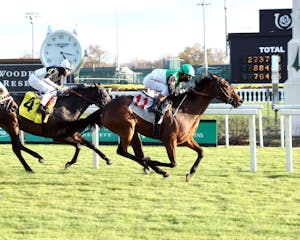Arrogate in the ascendant, and a Pegasus counterfactual for California Chrome

The only horse in history to turn the Travers (G1)/Breeders’ Cup Classic (G1) double, Arrogate further enhanced his stature in the world’s newly minted richest race. His Pegasus heroics would have been even more gratifying if California Chrome had been at his best for their rematch, which fizzled almost as soon as it began. Considering Arrogate’s superlative performance, however, only the most die-hard of “Chromies” could be convinced of a different result.
To anyone who questioned whether the 10-furlong star would be as devastating over the shorter nine-furlong trip, Arrogate delivered a categorical answer in the Pegasus. The Bob Baffert trainee uncorked a monster move on the far turn, putting his head in front at the six-furlong mark in 1:09.80, and blew the race apart through a mile in 1:33.90. Hall of Fame rider Mike Smith didn’t see a need to push him to the wire, and the big gray coasted home in 1:47.61 – not far off Lea’s track record of 1:46.86 established in the 2014 Donn H. (G1). His ears-cocked posture at the wire implies there was more in reserve if needed.
It’s a cruel irony, considering all of the concern about Arrogate’s recent foot abscess, that California Chrome was the one to be compromised by a physical issue. He exited his obviously subpar ninth-place finish with a right knee problem; according to several reports, there was some soreness and fluid in the area, and X-rays were to be taken upon his arrival at his new stud home, Taylor Made Farm. We can’t know exactly when the problem cropped up, but the signs were there early on.
Although Victor Espinoza hustled him from post 12 in an attempt to secure early position, “Chrome” was still hung out five wide into the first turn. He worked into a stalking spot on the backstretch, but didn’t appear to be traveling with his usual verve.
Indeed, the contrast with Arrogate, racing in tandem on the inside, was striking. Knowing the importance of breaking cleanly and quickly getting into stride, especially from his rail post, Smith had pumped Arrogate on in the first few jumps. The need-the-lead Noble Bird was faster in his scramble to take charge, but Arrogate soon settled into a smooth rhythm tucked just behind the pacesetter.
Meanwhile, Chrome was uncharacteristically coming under pressure after a half in :46.14, and it was obvious that he was done. Once Chrome couldn’t hold his position, Arrogate peeled off the rail and rolled past Chrome, and the race was a virtual cakewalk from there.
For the fun of a counterfactual, let’s imagine what might have happened with the real California Chrome. A perfectly sound Chrome would have kept Arrogate bottled up on the fence a little longer, until kicking on and trying to establish an insurmountable advantage.
But for that caper to work, Arrogate would have to be caught flat-footed when finally angling into the clear. Judging by his lethal pounce on the far turn, in a matter of strides, that scenario is doubtful. Had Chrome gotten first run, Arrogate wouldn’t have been far behind him. The sooner Chrome would have advanced, the sooner Arrogate gets out of the pocket. Since Espinoza was determined to ride differently from the Breeders’ Cup, it’s doubtful he would have held back too long just to race-ride Arrogate.
For another angle on the what-might-have-been, let’s turn to the BRIS Speed ratings. Arrogate notched a 112 in the Pegasus, his third lofty figure in succession after the Travers (BRIS all-time record 124) and Breeders’ Cup Classic (115). This sequence of high triple-digit Speed figures puts Arrogate in exalted company, as Ed DeRosa explains.
California Chrome turned in his career-best BRIS Speed rating (115) when collared by Arrogate in the Breeders’ Cup. Over his entire career, he’s garnered a 112 just once, in the Pacific Classic (G1). On both occasions, he was the controlling speed.
Of course, Chrome has been highly effective as a stalker too, but the common thread is his suddenly clearing away from his opponents. If Chrome gets in a dogfight, he’s liable to be outgunned. That’s not a knock on his character – he’s been thoroughly game and genuine his entire life. Rather, it’s a comment on his biggest weapon, his speed. If you can neutralize that by hanging with him, you have a real chance of outstaying him. It’s been a while since Chrome has encountered an opponent capable of doing that.
So to turn the tables on Arrogate, Chrome would have needed an effort near his career-best, and in circumstances that didn’t neatly replicate his previous bests. Since trainer Art Sherman believed that Chrome was better than ever going into the Pegasus, that’s theoretically possible. But I would argue that Chrome also needed Arrogate to regress. Instead, we saw yet another all-world performance from racing’s latest sensation.
Arrogate’s triple play of the Travers, Breeders’ Cup Classic, and Pegasus is special, not only because of its uniqueness, but because of the way he accomplished it. His troika came at three different tracks, in fast times, employing slightly different tactics. In the Travers, he seized the initiative and set the pace en route to a course record-shattering romp. In the Breeders’ Cup, he rallied from off the pace with a breathtaking late surge. In the Pegasus, he took up closer order early and left them for dead on the far turn.
But most of all, Arrogate swept through these majors as a lightly raced horse still on the upswing. He’s only got seven career starts under his belt, and as Baffert said last fall, Arrogate is still learning the game. If he’s in the ascendant now, how high can the son of Unbridled’s Song go? “The sky’s the limit” is an overused idiom, but in Arrogate’s case, it fits.
Photo courtesy Viola Jasko/Coglianese Photography
ADVERTISEMENT



